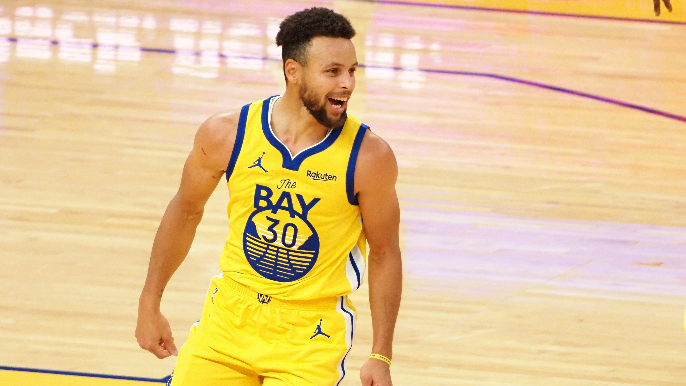I want it to happen. You want it to happen.
I see him play with my own eyes. You see him play with your own eyes.
I think Steph Curry is the Most Valuable Player in the NBA. You think Steph Curry is the Most Valuable Player in the NBA.
And yet, I’m here to break the bad news: It ain’t gonna happen, sports fans.
Despite my frequent desire to let my Sonny Corleone/knee-jerk passions overrule my Michael Corleone/carefully-considered logic, history is just too overwhelming to make the Steph MVP dream come true.
We’ve all seen Steph on this “special ride”, as he called it Wednesday night in Washington, D.C. We’ve seen him put up 30 or more 11 straight games, passing Michael Jordan and Kobe Bryant as the oldest player to do so. We’ve seen him average a staggering 38.7 points per game in April. We’ve seen him shoot 47.1% from 3-point land in April.
We’ve seen the jackrabbit pace. We’ve seen him shake double teams. We’ve seen him work step backs that sent George Hill and Matthew Dellavedova into the popcorn machine.
We’ve seen Chris Mullin hold up the handmade ‘MVP’ sign on NBC Sports Bay Area, and it all feels right and good and just. He’s Steph, man! He’s the best player we’ve ever seen!
And yet, he won’t win the MVP.
NBA voters just don’t reward players on .500 teams.
It would take a significant break of a historic trend for Steph to win MVP over the favorite, Nikola Jokic of Denver.
Whether you like it or not, the bulk of MVP voters reward players on winning teams.
Mind, there is no rule on this. The NBA leaves the criteria wide open. And, like everything else in this free society of ours, there is no shortage of varied opinion. I’ve seen voters say they give it to “the best player on the best team”, and I’ve seen voters say they liken an MVP vote to the Supreme Court justice definition of pornography: “I know it when I see it.”
Yet, the varied opinions result in one consistent theme: You win, you get MVP.
In the 21st century, the lowest win total of an MVP winner was Russ Westbrook’s 2018 Oklahoma City Thunder, who went 48-34, a win percentage of .585. For Steph’s Warriors to get to .585, they have to win 42 games, or every game left on the schedule.
Oh, also — Westbrook averaged a triple double that year. Insert wide-eyed emoji of shock here, kids.
The only other MVP in the last 40 years with a lower win percentage than Westbrook’s Thunder was Moses Malone of the Houston Rockets in 1981-82. His team went 46-36, a win percentage of .560. Steph’s Warriors would have to go 11-2 down the stretch to match that.
Oh, also — Malone led the league in rebounds and finished 2nd in scoring.
Steph’s credentials are mighty. He is the leading scorer in the league, and that ain’t chopped liver. He is leading a team from a 15-50 record last year to something between 35-40 wins this year, a turnaround of +20, at least.
Plus, there’s the eye test. He’s the most scintillating show in the league.
All due respect to the what’s-a-treadmill?-body of Nick Jokic, but his 26.4 points per game (10th in the league), 11 rebounds per game (9th in the league) and 8.7 assists (5th in the league) don’t make you jump out of your seat like Steph.
But the Nuggets are on pace to win 54 games, and the advanced metrics like “win share” tell you Jokic is numero uno.
(BTW, you calculate “win share” by dividing marginal points per win by marginal offense, and thank you for the cold-sweat flashback to ninth grade math.)
Steph’s “win share” is that he wins hearts and minds every time he plays basketball. He is, by my definition, the MVP — the best player in the league, and good enough that he lifts his team to a far loftier perch than it otherwise would be; more so than any other player.
Hence, MVP.
Tell that to the voters. Maybe they can buck history, and do the right thing. Just don’t get your hopes up.


